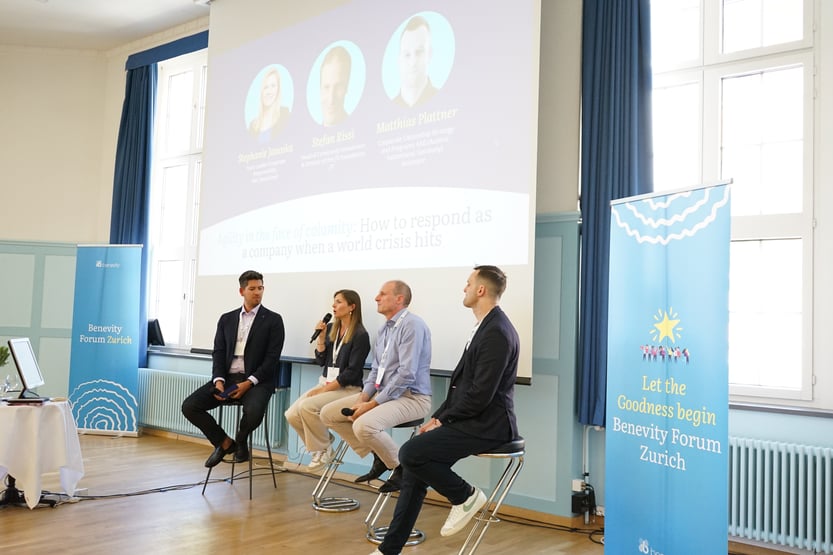Reacting to a crisis: How companies address the unexpected

In today's dynamic business landscape, companies are increasingly faced with the need to respond to various crises, whether they are natural disasters, political conflicts, or humanitarian emergencies. Reacting to a crisis requires careful planning, coordination, and effective communication to ensure a company's response is meaningful and impactful.
We dug into this topic with three industry experts during a panel at Benevity Forum Zurich to better understand how companies approach crisis response and what strategies they employ to make a positive impact. Stephanie Janoska, Team Lead Corporate Responsibility at PwC Switzerland, Stefan Rissi, Head of Community Investment & Director of the JTI Foundation, and Matthias Plattner, Corporate Citizenship Strategy & Programs ASG (Austria, Switzerland, Germany) at Accenture shared valuable insights on how their respective organisations approach crisis management and the key considerations when deciding to engage in response efforts.
Decision-making in crisis response
When it comes to deciding which crises to address, the panelists emphasised the importance of a structured approach. Stefan highlighted the need to apply logic and operational criteria when evaluating whether support is feasible in a particular crisis context. Factors such as political risks, operational capacity, and the presence of established partnerships play a significant role in determining his organisation's involvement.
As a corporate foundation dedicated to disaster management, the JTI Foundation provides specialised support to JTI as a business in managing crises. Stefan shared that they take the approach of keeping disaster management somewhat separate from the overall operations of the business and the emotions of the employees, allowing for professionalism and logic to prevail. By establishing partnerships with NGOs and rescue groups, JTI ensures a coordinated response in times of crisis.
We felt we need to keep this a bit separate from, let's say, employee feelings and interests and views and organise ourselves in a way that we can do this professionally.
Stefan Rissi, Head of Community Investment & Director of the JTI Foundation
Matthias echoes this sentiment, emphasizing the significance of having a process in place to assess crises. This process involves establishing partnerships with NGOs and social organisations, relying on their expertise and local presence to guide response efforts effectively. Taking the time to assess the situation thoroughly and engage reliable partners helps ensure that the company's response is well-informed and impactful. He said, “the answer is to have a process, to have established partnerships and to take your time. I think that's the most important thing.”
While on a global scale PwC acts similar to JTI and Accenture, Stephanie's local team in Switzerland has a slightly different approach. On the local level, as soon as a crisis occurs, a crisis team comes together with employees from various departments to examine where PwC entities, including colleagues and family members all around the world, and the business are affected and how urgent help is needed.

Supporting communities in crisis
Financial support is often crucial in the immediate aftermath of a crisis. Organisations provide avenues for employees to donate funds, and some offer corporate matching to amplify individual contributions. These financial resources are channelled to established NGOs working on the ground, ensuring that the support reaches those who need it most.
That is why, at PwC, the first step is usually to launch a donation option. To provide additional support, they also aim to bring together their greatest assets, their people, and their individual skills, experience, and talent to support communities in need. Stephanie emphasised the employee-driven nature of their community engagement, where colleagues are encouraged to initiate their own initiatives and connect with NGOs or social organisations working in the affected areas.
Our employees have reached out to us and said we'd like to help in other ways, we'd like to do something and not just donate money. We'd like to get involved and do something for people.
Stephanie Janoska, Team Lead Corporate Responsibility at PwC Switzerland
One example from the Ukraine crisis shows what remarkable actions can emerge through this employee-driven approach. A PwC employee founded their own NPO to collect aid supplies and transport them to the Ukrainian border – all with support from PwC.
For JTI, it looks a little different. As Stefan elaborated once again, the JTI Foundation enables JTI to delegate crisis management to specialised organisations while preventing political challenges that can come up through personal views and emotions of employees. So they use existing funding to support affected communities long-term, for example through reconstruction, but they do also facilitate employee donations and match them with NGOs that align with the company's goals.
At Accenture, a significant part of crisis reaction lies within a sustainable impact, long-term engagement, and rebuilding efforts. Corporate social responsibility should extend beyond immediate relief and focus on supporting affected regions for the long haul. To emphasise that, Matthias shared an example of the recent crisis after the earthquake in Turkey and Syria, where their employee resource groups started a project to mentor people in the affected areas to rebuild their businesses.
Effective communication strategies
 Clear and timely communication is vital during crisis response efforts to maintain transparency and foster trust. Through their long-standing partnerships with NGOs, JTI can provide immediate communication in the early stages, usually within a couple of hours after a crisis hits. This reassurance helps alleviate the need for immediate communication from the organisation, allowing time for reflection and strategic planning.
Clear and timely communication is vital during crisis response efforts to maintain transparency and foster trust. Through their long-standing partnerships with NGOs, JTI can provide immediate communication in the early stages, usually within a couple of hours after a crisis hits. This reassurance helps alleviate the need for immediate communication from the organisation, allowing time for reflection and strategic planning.
While the level of interest from employees may vary, it remains essential to communicate the sustained efforts and positive outcomes resulting from long-term engagement. By sharing success stories and ongoing projects, companies can inspire employees and demonstrate their dedication to corporate social responsibility. PwC, for example, set up an information hub around the Ukraine crisis and leveraged an engagement platforms to share updates, impact stories, and progress on projects. By keeping employees informed about ongoing initiatives, PwC aims to maintain engagement and ensure a sustained focus on crisis management.
Matthias emphasised the importance of communicating actions and results rather than creating an overarching communication strategy. Transparency and authenticity are key, particularly when engaging with stakeholders, including employees and the broader community. By documenting and sharing the progress and impact of crisis response initiatives, companies can foster trust and demonstrate their long-term commitment to the affected regions.
Especially in the younger generation, you are measured by what you do, and they will find out if you really do something or if you are just sharing nice numbers. It is about truly doing something, and that's the hard thing.
Matthias Plattner, Corporate Citizenship Strategy & Programs ASG at Accenture
In a world where crises are becoming more frequent and complex, companies have the opportunity and responsibility to use their resources, expertise, and influence to make a positive difference. By embracing a proactive and holistic approach to crisis response, companies can contribute to the well-being and resilience of communities in need, while also fostering a culture of social responsibility within their organisations.
Keeping a pulse on future CSR and ESG trends
At our Benevity Forum in Zurich, we saw once again how important it is to exchange views on new trends in CSR and ESG and how helpful the conversation with other companies can be. To keep track of the latest trends and developments, you can always take a look at our resources, where we share exciting articles, guides and e-books on the topics of CSR and ESG for you.
